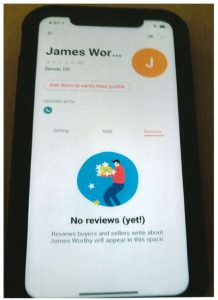Online Marketplace Defeats Lawsuit Over Murder–Roland v. Letgo
 I previously summarized this case:
I previously summarized this case:
This is a tragic case involving the marketplace app Letgo. Using an alias, Brown listed a stolen car for sale on the app. The Rolands agreed to meet Brown in person to buy the car. At the meeting, Brown tried to rob them at gunpoint. When the husband fought back, Brown shot them both dead. This lawsuit seeks to hold Letgo liable for the murders.
On appeal, the Tenth Circuit affirms the dismissal–without relying on Section 230.
Negligence. The plaintiffs claim “Letgo made three representations that actively increased the risk of harm to users like the Rolands: (1) it worked closely with law enforcement and used machine-learning technology to identify and block inappropriate and stolen merchandise, (2) it designated users as “verified with” certain personal information, and (3) it advertised its verification features and promoted the platform’s safety.” The court summarized:
According to plaintiffs, Letgo created an illusion that accounts like Mr. Brown’s could be trusted but undertook no actual verification procedures. Thus, plaintiffs argue Letgo increased the risk that users like the Rolands would purchase stolen products or meet a seller who would cause them harm
The court rejects all of allegedly negligent representations:
the representation concerning its work with law enforcement and use of technology to locate inappropriate or stolen items did not increase any risk of harm to the Rolands. Letgo had safety guidelines on its platform, warning users to take steps to protect themselves before buying or selling online, to meet in a public place during the day, to find another buyer or seller if there are any doubts about a user’s authenticity, and to take proper precautions even if most Letgo users are trustworthy. Thus, in context, Letgo’s statements are not an expression of approval that its platform is safe and that all users are trustworthy…
the representation that Mr. Brown was “verified with” his phone number is similarly not a stamp of approval. His profile, taken as a whole, shows the opposite conclusion. Letgo prompted users in red font—and at the top of his profile—to ask “James Worthy” to verify his profile. [Eric’s note: the image above shows this.] The profile had no reviews and no profile photo. The designation on Mr. Brown’s profile that he was “verified with” his phone number, taken in context, is not an expression of approval that he was trustworthy and did not increase the risk of harm to the Rolands….
Letgo’s advertisements about its verification procedure did not create or increase a risk. Plaintiffs allege certain unspecified advertisements made by Letgo increased the risk of harm to the Rolands because Letgo was not actually verifying users. But no facts are alleged that Letgo misapplied, or failed to apply, its verification procedures….Letgo’s website made clear there were always risks involved with transacting with strangers online.
Having addressed the allegations over Letgo’s representations, all other alleged failings by Letgo fit into the “nonfeasance” category but the Rolands didn’t have the requisite special relationship with Letgo. The court also questions Letgo’s causation because of the murderer’s intervening crime, making Letgo’s lack of user verification “insignificant and not a substantial factor in causing the murders.”
Fraud/Negligent Misrepresentation. The court again rejects for lack of causation.
Consumer Protection Act. The court says all of the highlighted statements were substantially true.
 Section 230. The district court had dismissed the case on non-230 grounds. It said 230 was not available to Letgo because, per Accusearch, “Plaintiffs have sufficiently pleaded, for a motion under Rule 12(b)(6), that Defendants contributed in part to the allegedly offending ‘verified’ representation.” That was an obviously problematic conclusion. Nevertheless, the Tenth Circuit dodges it: “We need not reach this issue. Since we affirm the district court’s rulings on the state law claims, we need not resolve the federal law cross appeal.” Yet another case where Section 230 reform wouldn’t change the outcome.
Section 230. The district court had dismissed the case on non-230 grounds. It said 230 was not available to Letgo because, per Accusearch, “Plaintiffs have sufficiently pleaded, for a motion under Rule 12(b)(6), that Defendants contributed in part to the allegedly offending ‘verified’ representation.” That was an obviously problematic conclusion. Nevertheless, the Tenth Circuit dodges it: “We need not reach this issue. Since we affirm the district court’s rulings on the state law claims, we need not resolve the federal law cross appeal.” Yet another case where Section 230 reform wouldn’t change the outcome.
Implications
Aggressive plaintiffs might have bypassed Section 230 in other ways beyond the Accusearch workaround, including alleging that Letgo or its verification process was defectively designed; or by invoking courts’ sometimes reluctance to apply Section 230 to offline incidents, even if the service only acted as messaging service. But we now know that this case was never meritorious, with or without Section 230.
Because the ruling turns on its specific facts, it doesn’t necessarily help other services win a motion to dismiss. Indeed, it’s troubling to see plaintiffs litigating over a service’s efforts to “verify” users, because we generally want services to undertake authentication and verification services when they enhance site trustworthiness and safety. This creates another variation of the moderator’s dilemma. if services are liable for failed efforts to authenticate/verify, they won’t try to do this socially valuable work at all.
Case Citation: Roland v. Letgo, Inc., 2024 WL 372218 (10th Cir. Feb. 1, 2024)
